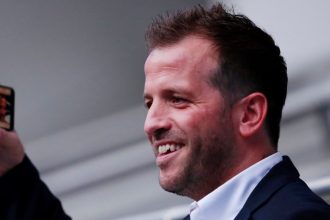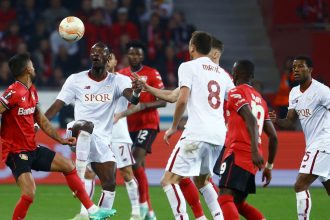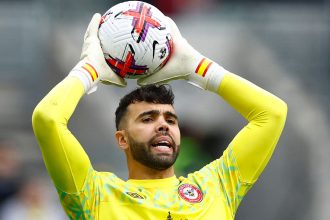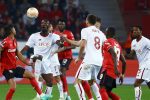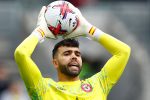The midfielder played three times at senior level for the Republic before deciding his career would be better served by switching allegiances
On March 22, 2019, Declan Rice came on as a substitute for England in their Euro 2020 qualifying clash with the Czech Republic at Wembley. It was a momentous occasion for the midfielder, his second senior international debut.
His first had come the year previously for the Ireland, in a friendly in Turkey, and he would earn two more caps for ‘The Boys in Green’ before making himself unavailable for selection for competitive fixtures in the second half of 2018.
Still, Rice, who was just a teenager at the time, had made such a positive first (second and third) impression that he was voted Ireland's Young Player of the Year. Unfortunately, by the time the annual awards ceremony rolled around, on March 17, 2019, he had already controversially defected to England.
The FAI nonetheless felt compelled to "honour the integrity of the voting process" by confirming Rice as the victor but, despite “wishing him well in the future”, revealed that he would not be in Dublin to pick up his prize. Rice will, however, be in the Irish capital on Saturday night – and can expect a belated and bitter backlash to his betrayal.
Getty 'Ready for a bit of abuse'
Rice isn't the only member of the England squad to have previously played for Ireland, of course. Jack Grealish also represented the Republic at under-age level and could be targeted by the crowd at the Aviva Stadium this weekend.
Indeed, Callum Robinson, who performed the opposite switch of allegiances to Grealish, admitted earlier this week that his close friend is probably "getting ready for a bit of abuse". However, as Robinson acknowledged, his former Aston Villa team-mate gets booed pretty much everywhere he goes; Dublin won't really be any different in that regard.
Like Rice, Grealish represented Ireland all the way up to the Under-21s but, unlike Rice, he was never capped at senior level. Even more significantly, the winger didn't keep Ireland waiting for months on end before declaring for England.
AdvertisementGetty 'Where else would he want to go?'
As Rice progressed through the youth-team ranks with Ireland, he repeatedly insisted he was fully committed to the cause, driven by the pride of representing the homeland of his paternal grandparents.
He even kissed the crest on the Irish shirt while celebrating a dramatic win for the U21s over Azerbaijan in March 2018 – a gesture that garnered great attention from a long-suffering set of supporters desperate for Rice to remain with the Republic simply because there were already serious doubts by that stage over where his allegiances really lay.
Former assistant coach Roy Keane was adamant that Rice had no intention of quitting Ireland. During just one of a number of press conferences dominated by questions over Rice's future, the former captain was asked if the youngster had "given every indication" of wanting to only represent Ireland.
"Yeah, because he is Irish," Keane replied in his typically matter-of-fact manner. "Where else would he want to go? If you had to choose Ireland or England, it is pretty straightforward, isn't it? Ireland."
Keane couldn’t have been more wrong, though.
'Proud Englishman'
In August 2018, Rice refused an Ireland call-up ahead of the Nations League clash with Wales. Then-manager Martin O’Neill revealed that the player had been approached by England and that Rice was “taking time to make his mind up”.
From that moment on, there was never any doubt which way the decision would go. From a sporting perspective, it was a no-brainer. England had just finished fourth at the World Cup; Ireland hadn’t even made the finals since 2002. Then, there were their financial considerations.
"I think Declan has a new agent and he’ll be in his ear,” former Ireland winger Damien Duff told . "England international versus being an Ireland international – that’s the bit agents look at. He’ll be in his ear to play for England rather than little old Ireland.
"If [playing for Ireland] has meant as much to him as he said – he was kissing the badge after one game – if he hasn’t lied and that’s the truth, then it won’t be a difficult decision for him. But he may have been convincing himself he is Irish for the last few years and, at the end of the day, he’s English – he was born in England.”
The question of identity is not often so easily resolved but, in Rice’s case, it really was. After confirming his transfer, he stated that while he was “proud of his Irish heritage”, he was “a proud Englishman”. Presumably, he always had been too, which left many wondering why he’d agreed to represent Ireland in the first place. The answer was obvious of course: it was a chance to improve as a player and advance his career.
GettyDon't hate the player, hate the game
Nationality can be a complex and divisive issue. Choosing which country to represent is sometimes a tough choice for players from mixed-heritage backgrounds, and particularly for those not yet out of their teens.
It should also be noted that as long as football’s rules of eligibility remain so loose, both players (or, perhaps more accurately, those advising them) and national associations will look to exploit the legal loopholes.
The FAI has certainly made excellent use of ‘the granny rule’ over the past 40 years (and particularly during their hugely successful Jack Charlton era) and they continue to target promising players overlooked by England, such as Kasey McAteer, the Northampton-born Leicester City attacker who has been included in the latest Irish squad.
However, as the Rice case underlines, there is an inherent risk in adopting such an approach: English players that prove their world-class potential are likely to end up wanting to play for England. Remember, Rice was not a prodigious talent. He was not considered the next big thing when he was growing up. He was even famously released by Chelsea as a 14-year-old.
So, when was offered the chance to play international football at a time when the country of his birth didn’t want him, he unsurprisingly embraced that opportunity. He wasn’t the first to do so and he certainly won’t be the last. As they say, don’t hate the player, hate the game.
